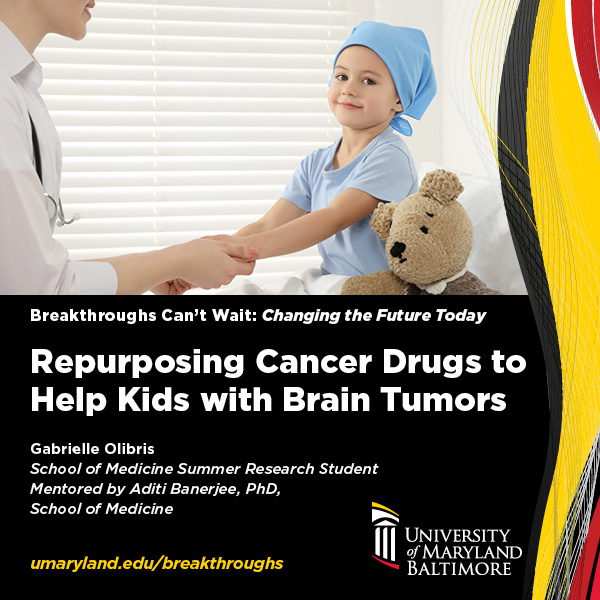Breakthroughs Can’t Wait: Can a Proven Cancer Drug Be Reimagined to Fight Brain Tumors in Kids?
October 29, 2025 UMB Office of Communications and Public Affairs
UMB ACS-IMPACT research scholar Gabrielle Olibris spent her summer targeting medulloblastoma, a pediatric brain cancer, with a novel therapeutic compound used to treat prostate cancer.
At the University of Maryland, Baltimore (UMB), groundbreaking discoveries happen every day — transforming medicine, improving health, and shaping the future. From changing legal policy to pioneering treatments to cutting-edge scientific breakthroughs, UMB researchers are tackling real-world challenges and making a lasting impact on lives everywhere.
In our “Breakthroughs Can’t Wait: Changing the Future Today” series of videos, we will dive into inspiring stories of innovation from across UMB’s seven schools. See how scientists, doctors, and experts are addressing today’s most pressing issues — fueled by the critical support of government funding that drives progress forward.
As an ACS-IMPACT research scholar at the University of Maryland, Baltimore, Gabrielle Olibris spent her summer in the lab of Aditi Banerjee, PhD, targeting medulloblastoma, a pediatric brain cancer, with a novel therapeutic compound called BNPP-433.3 Beta.
“We were trying to determine the efficacy of the compound in treating medulloblastoma — so killing off the medulloblastoma cells in our specific cell line, which was DAOY,” Olibris explained. Because the brain is difficult to treat safely, especially in children, the team aimed to identify a compound that could be both effective and less toxic.
“The brain is the information center of the rest of the body, so it’s harder to target cancer within the brain,” Olibris said. She added that treating pediatric cancers presents an even greater challenge because therapies that work for adults can cause more severe side effects in children. BNPP-433.3 Beta shows strong potential, she said, explaining, “This is already patented, so it’s a drug that’s already being used to treat prostate cancer.”
Olibris’ motivation for pursuing cancer research is personal. “When I was in the sixth grade, my dad had prostate cancer,” she said. “I’ve always known I wanted to be a doctor and work in pediatrics. I love my own pediatrician, and I really enjoyed working with children.”
By exploring a new use for an existing cancer drug, Olibris hopes to help advance research that could lead to safer, more effective treatments for children.
Watch the video below as Olibris discusses her work.